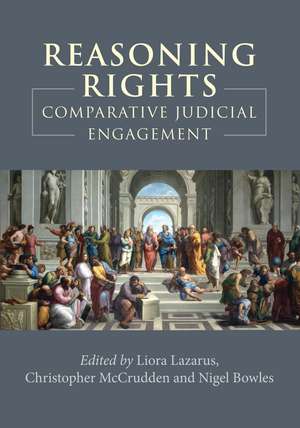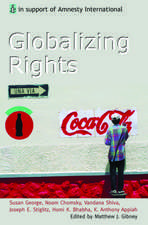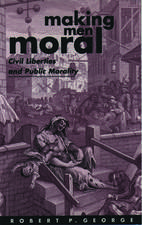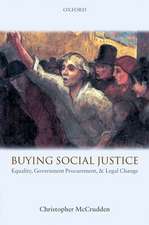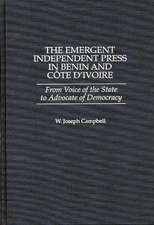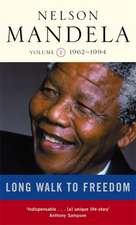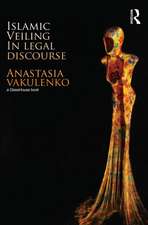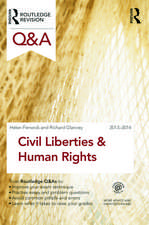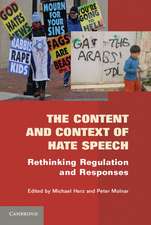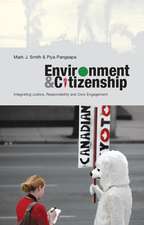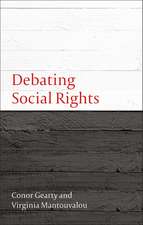Reasoning Rights: Comparative Judicial Engagement
Editat de Dr Liora Lazarus, Professor Christopher McCrudden, Dr Nigel Bowlesen Limba Engleză Paperback – 28 sep 2016
| Toate formatele și edițiile | Preț | Express |
|---|---|---|
| Paperback (1) | 277.20 lei 6-8 săpt. | |
| Bloomsbury Publishing – 28 sep 2016 | 277.20 lei 6-8 săpt. | |
| Hardback (1) | 576.15 lei 6-8 săpt. | |
| Bloomsbury Publishing – 2 iul 2014 | 576.15 lei 6-8 săpt. |
Preț: 277.20 lei
Preț vechi: 351.54 lei
-21% Nou
Puncte Express: 416
Preț estimativ în valută:
53.06€ • 57.65$ • 44.60£
53.06€ • 57.65$ • 44.60£
Carte tipărită la comandă
Livrare economică 21 aprilie-05 mai
Preluare comenzi: 021 569.72.76
Specificații
ISBN-13: 9781509908431
ISBN-10: 1509908439
Pagini: 392
Dimensiuni: 169 x 244 x 26 mm
Greutate: 0.69 kg
Ediția:NIPPOD
Editura: Bloomsbury Publishing
Colecția Hart Publishing
Locul publicării:London, United Kingdom
ISBN-10: 1509908439
Pagini: 392
Dimensiuni: 169 x 244 x 26 mm
Greutate: 0.69 kg
Ediția:NIPPOD
Editura: Bloomsbury Publishing
Colecția Hart Publishing
Locul publicării:London, United Kingdom
Caracteristici
This book looks at comparative reasoning in human rights cases, exploring the question: how is it that notionally universal norms are reasoned by courts in such dramatically different ways?
Notă biografică
Liora Lazarus is a Fellow in Law and University Lecturer in Law at St Anne's College, University of Oxford. Christopher McCrudden FBA is Professor of Equality and Human Rights Law, Queen's University Belfast; William W Cook Global Professor of Law at University of Michigan Law School; and a member of Blackstone Chambers.Nigel Bowles is Director of the Rothermere American Institute at the University of Oxford.
Cuprins
Part 1: INTRODUCTION 1. The Pluralism of Human Rights Adjudication Christopher McCrudden Part 2: PROPORTIONALITY 2. Constructing the Proportionality Test: An Emerging Global Conversation Kai Möller 3. Necessity and Proportionality: Towards a Balanced Approach David Bilchitz 4. Proportionality Without Balancing: Why Judicial Ad hoc Balancing is Unnecessary and Potentially Detrimental to the Realisation of Individual and Collective Self-determination Jochen von Bernstorff 5. Proportionality in United States Constitutional Law Paul Yowell Part 3: NATIONAL SECURITY AND HUMAN RIGHTS 6. 'To the Serious Detriment of the Public': Secret Evidence and Closed Material Procedures Ryan Goss 7. National Security Law and the Creep of Secrecy: A Transatlantic Tale Tom Hickman and AdamTomkins 8. Navigating the Shoals of Secrecy: A Comparative Analysis of the Use of Secret Evidence and 'Cleared Counsel' in the United States, the United Kingdom, and Canada David Cole and Stephen I Vladeck 9. The Secret Keepers: Judges, Security Detentions, and Secret Evidence Shiri Krebs Part 4: RELIGION AND HUMAN RIGHTS 10. The Intersection of Religious Autonomy and Religious Symbols: Setting the Stage Christopher McCrudden and Brett G Scharffs 11. Principles and Compromises: Religious Freedom in a Time of Transition Carolyn Evans 12. State Interference in the Internal Affairs of Religious Institutions Johan D Van der Vyver 13. The Protection of Religious Freedom in Australia: A Comparative Assessment of Autonomy and Symbols Paul Babie and James Krumrey-Quinn Part 5: SOCIO-ECONOMIC RIGHTS 14. The Emergence and Enforcement of Socio-Economic Rights Murray Wesson 15. The Problematic of Social Rights - Uniformity and Diversity in the Development of Social Rights Review Colm O'Cinneide 16. A South African Perspective on the Judicial Development of Socio-Economic Rights 319 Edwin Cameron 17. Judicial Activism and the Indian Supreme Court: Lessons for Economic and Social Rights Adjudication Anashri Pillay 18. American Exceptionalism over Social Rights Jeff King
Recenzii
...this volume constitutes a very interesting, relevant and necessary insight into the legitimacy of courts entrusted with the task of reasoning and balancing rights. All chapters are of a very high academic standard and can be used not only by legal professionals but also by undergraduate and postgraduate students. .every university library should have this book in their catalogue. It can be recommended to a broad spectrum of law specialists interested in human rights and comparative law, European and international law as well as constitutional and administrative law.
The book is comprised of contributions by a team of world-leading human rights scholars that move beyond simply addressing the institutional questions, concerning courts and human rights (...) instead is a deeper examination of the similarities and divergence of reasonings by different courts when addressing comparable human rights questions.
The book is comprised of contributions by a team of world-leading human rights scholars that move beyond simply addressing the institutional questions, concerning courts and human rights (...) instead is a deeper examination of the similarities and divergence of reasonings by different courts when addressing comparable human rights questions.
Descriere
This book explores the question: why are notionally universal norms reasoned by courts in such dramatically different ways? What is the shape of this reasoning; what techniques are common across the transnational jurisprudence; and what are diverse?
